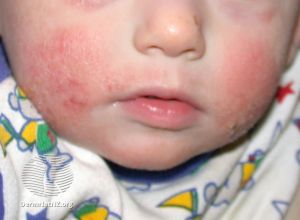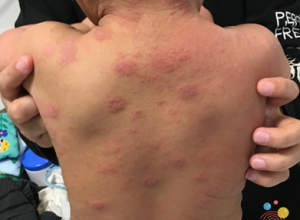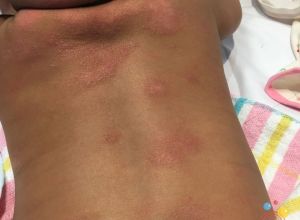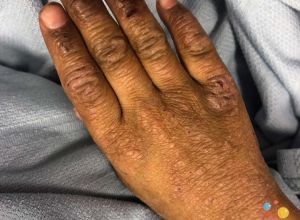Eczema (Skin Condition)




Eczema (also called atopic eczema or atopic dermatitis) is a very common dry skin condition. It affects about 1in 5 babies and children in the UK. Eczema often appears in the first few months of life. Eczema usually improves in most children as they get older, but some children with more severe eczema may continue to have eczema into adult life.
Eczema can cause the skin to become itchy, dry, cracked and sore. Sometimes, children with eczema may have periods where the eczema becomes more severe (flare ups).
Many things, called “trigger factors” can make the eczema worse. These include soaps or bubble baths, allergens (for example, house dust mite, pollen, pet fur), change in temperature, stress, weather and occasionally food.
Use this link to learn about household triggers and how to manage them. Click Here
There is currently no cure for eczema, however avoidance of trigger factors (those which make the eczema worse) and use of moisturisers 3-4 times a day with other treatments can help keep it under control.
The exact cause of eczema is unknown, but it is clear it is not down to one single thing. Atopic eczema often occurs in people who get allergies. “Atopic” means sensitivity to allergens. This type of eczema can run in families, and often develops alongside other conditions such as asthma and hay fever.
See related topics: rashes (babies) and rashes (children)
Images in this section are from DermNet and Don't Forget the Bubbles, used with permission.
Eczema in babies often appears at between 3-6 months of age although it can develop just after birth or anytime in childhood.
The main features of eczema are
- Intense itch
- Dry skin
- Rash
- Redness
- Inflammation
In infants and babies, eczema affects the face, scalp and body with the nappy area usually spared. As your child grows older and becomes more mobile, the pattern of eczema changes to involve the elbow and the knee creases and sometimes affects the whole body.
In children of Asian, black Caribbean, black African ethnic groups, eczema may present differently with eczema affecting the front surface of the knee or wrist, the skin may look bumpy and slightly darker rather than red.
It is important to be aware of and look for signs of worsening eczema.
Recognise a flare: A ‘flare’ is a worsening of the eczema. Skin may become red, sore, (more)itchy, crack or bleed.
Recognise infected eczema: If skin suddenly worsens, weeps or crusts it could be infected and your child may need antibiotics – seek urgent advice if child unwell or the infection is widespread.
Blisters or cold sores need urgent antiviral treatment – see your GP or seek medical advice the same day.
Food allergy: this is rare - consider food allergy if eczema started as a baby. It is not usually the cause of eczema in older children.
Treatment of eczema can help relieve symptoms and many cases improve over time. But there is currently no cure and severe eczema often can have significant impact on daily life. There is also an increased risk of skin infections due to the eczema itself and scratching.
Top Tips
-
Moisturise every day, even when the skin is clear
-
Apply moisturiser using downward strokes – do not rub in
-
Do an extra rinse when washing clothes
-
Wear soft, comfortable, loose clothing
-
Keep fingernails short to prevent damage to skin
Emollients
- Emollients are moisturisers that soften the skin - it is okay to try different emollients – talk to your GP/nurse if you do not like one you have been given.
- Expect to use large amounts – up to a large pump/tub (250-500 g) per week.
- Use everyday, all over-you may need to change emollient type if one does not work.
- Emollients form a protective barrier to outside irritants. These are best used few minutes after a warm bath, while the skin is still slightly damp.
- Emollients are safe so they can be used as many times as required.
- Use plenty when skin looks dry and is flared, at least twice a day when skin clear but increase to 4-6 times a day during flare ups.
- Do not put hands in TUBS of ointment as these can introduce “bugs” easily which is a common reason for recurrent infected eczema. Use a clean spoon or spatula to get ointment out of tub.
- For school and for older children/ young people creams in pumps may be better.
- Apply in direction of hair growth, not against, as this can cause infection of hair follicle.
- Fire hazard – most eczema treatments contain paraffin and are flammable.
Bathing & Showering
- Avoid Bubble baths and perfumed products (some of the eczema bath products can provide bubbles if put in running water).
- Use your moisturiser (emollient) or a soap free wash to cleanse skin - soap or soap based products can dry the skin.
- Bath water should be tepid/lukewarm as heat is a common trigger.
- Skin should be patted dry after bath.
Topical (On Skin) Steroids
- Steroid- creams and ointments are treatments for flares of eczema and help heal the skin. Steroids come in different strength from mild to strong steroids.
- Steroids are safe when used in short courses as advised by your doctor. When applying it is important to apply sparingly to the skin so that skin glistens.
- Use topical steroids once a day to eczema that is red and itchy – stop when not red and itchy and re- start if eczema comes back.
- It is advisable to leave a gap of around 20 mins between applying your emollient and steroid. This is so that the topical steroid is not diluted or made less effective by the emollient.
See your doctor if:
Eczema is infected – pustules, blisters, painful, weeping – antibiotics may be needed.
Eczema is not going away with regular daily use of topical steroids for more than 2 weeks.
Eczema is causing waking at night, missing school or mood problems.
Where should you seek help?
- If it is non-urgent speak to your local pharmacist or health visitor
- If your child has any of the above features, urgently see your GP. For an urgent out-of-hours GP appointment, call NHS 111
- You should only call 999 or go to your nearest A&E department in critical or life threatening situations
For wear and tear, minor trips and everything in between.
Self-care
You can treat your child's very minor illnesses and injuries at home.
Some illnesses can be treated in your own home with support and advice from the services listed when required, using the recommended medicines and getting plenty of rest.
Sound advice
Children can recover from illness quickly but also can become more poorly quickly; it is important to seek further advice if a child's condition gets worse.
For information on common childhood illnesses go to What is wrong with my child?
Pharmacists are experts in many aspects of healthcare and can offer advice on a wide range of long-term conditions and common illnesses such as coughs, colds and stomach upsets. You don’t need an appointment and many have private consultation areas, so they are a good first port of call. Your pharmacist will say if you need further medical attention.
Sound advice
- Visit a pharmacy if your child is ill, but does not need to see a GP.
- Remember that if your child's condition gets worse, you should seek further medical advice immediately.
- Help your child to understand - watch this video with them about going to the pharmacy.
For information on common childhood illnesses go to What is wrong with my child?
Health visitors are nurses or midwives who are passionate about promoting healthy lifestyles and preventing illness through the delivery of the Healthy Child Programme. They work with you through your pregnancy up until your child is ready to start school.
Health Visitors can also make referrals for you to other health professionals for example hearing or vision concerns or to the Community Paediatricians or to the child and adolescent mental health services.
Contact them by phoning your Health Visitor Team or local Children’s Centre.
Sound advice
Health visitors also provide advice, support and guidance in caring for your child, including:
- Breastfeeding, weaning and healthy eating
- Exercise, hygiene and safety
- Your child’s growth and development
- Emotional health and wellbeing, including postnatal depression
- Safety in the home
- Stopping smoking
- Contraception and sexual health
- Sleep and behaviour management (including temper tantrums!)
- Toilet training
- Minor illnesses
For more information watch the video: What does a health visitor do?
School nurses care for children and young people, aged 5-19, and their families, to ensure their health needs are supported within their school and community. They work closely with education staff and other agencies to support parents, carers and the children and young people, with physical and/or emotional health needs.
Primary and secondary schools have an allocated school nurse – telephone your child’s school to ask for the contact details of your named school nurse.
There is also a specialist nurse who works with families who choose to educate their children at home.
Sound Advice
Before your child starts school your health visitor will meet with the school nursing team to transfer their care to the school nursing service. The school nursing team consists of a school nursing lead, specialist public health practitioners and school health staff nurses.
They all have a role in preventing disease and promoting health and wellbeing, by:-
- encouraging healthier lifestyles
- offering immunisations
- giving information, advice and support to children, young people and their families
- supporting children with complex health needs
Each member of the team has links with many other professionals who also work with children including community paediatricians, child and adolescent mental health teams, health visitors and speech and language therapists. The school health nursing service also forms part of the multi-agency services for children, young people and families where there are child protection or safeguarding issues.
If you’re not sure which NHS service you need, call 111. An adviser will ask you questions to assess your symptoms and then give you the advice you need, or direct you straightaway to the best service for you in your area.
Sound advice
Use NHS 111 if you are unsure what to do next, have any questions about a condition or treatment or require information about local health services.
For information on common childhood illnesses go to What is wrong with my child?
A&E departments provide vital care for life-threatening emergencies, such as loss of consciousness, suspected heart attacks, breathing difficulties, or severe bleeding that cannot be stopped. If you’re not sure it’s an emergency, call 111 for advice.


